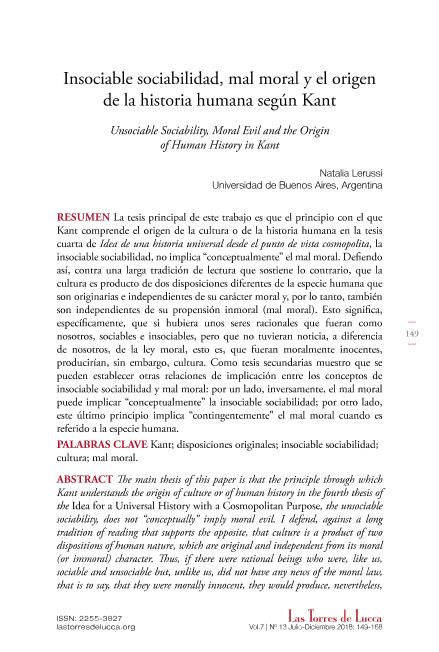Mostrar el registro sencillo del ítem
dc.contributor.author
Lerussi, Natalia Andrea

dc.date.available
2020-05-04T19:45:06Z
dc.date.issued
2018-12
dc.identifier.citation
Lerussi, Natalia Andrea; Insociable sociabilidad, Mal moral y el origen de la historia humana según Kant; Universidad Complutense de Madrid; Las Torres de Lucca; 7; 13; 12-2018; 149-168
dc.identifier.issn
2255-3827
dc.identifier.uri
http://hdl.handle.net/11336/104180
dc.description.abstract
La tesis principal de este trabajo es que el principio con el que Kant comprende el origen de la cultura o de la historia humana en la tesis cuarta de Idea de una historia universal desde el punto de vista cosmopolita, la insociable sociabilidad, no implica “conceptualmente” el mal moral. Defiendo así, contra una larga tradición de lectura que sostiene lo contrario, que la cultura es producto de dos disposiciones diferentes de la especie humana que son originarias e independientes de su carácter moral y, por lo tanto, también son independientes de su propensión inmoral (mal moral). Esto significa, específicamente, que si hubiera unos seres racionales que fueran como nosotros, sociables e insociables, pero que no tuvieran noticia, a diferencia de nosotros, de la ley moral, esto es, que fueran moralmente inocentes, producirían, sin embargo, cultura. Como tesis secundarias muestro que se pueden establecer otras relaciones de implicación entre los conceptos de insociable sociabilidad y mal moral: por un lado, inversamente, el mal moral puede implicar “conceptualmente” la insociable sociabilidad; por otro lado, este último principio implica “contingentemente” el mal moral cuando es referido a la especie humana.
dc.description.abstract
The main thesis of this paper is that the principle through which Kant understands the origin of culture or of human history in the fourth thesis of the Idea for a Universal History with a Cosmopolitan Purpose, the unsociable sociability, does not “conceptually” imply moral evil. I defend, against a long tradition of reading that supports the opposite, that culture is a product of two dispositions of human nature, which are original and independent from its moral (or immoral) character. Thus, if there were rational beings who were, like us, sociable and unsociable but, unlike us, did not have any news of the moral law, that is to say, that they were morally innocent, they would produce, nevertheless,ulture. As a secondary thesis, I show that other relationships of implication between the concepts of unsociable sociability and moral evil can be established: on one hand, I inversely show that moral evil can “conceptually” imply unsociable sociability and, on the other, that the latter principle contingently implies moral evil when it is referred to human being.
dc.format
application/pdf
dc.language.iso
spa
dc.publisher
Universidad Complutense de Madrid

dc.rights
info:eu-repo/semantics/openAccess
dc.rights.uri
https://creativecommons.org/licenses/by/2.5/ar/
dc.subject
INSOCIABILIDAD
dc.subject
SOCIABILIDAD
dc.subject
MAL MORAL
dc.subject
KANT
dc.subject
CULTURA
dc.subject.classification
Filosofía, Historia y Filosofía de la Ciencia y la Tecnología

dc.subject.classification
Filosofía, Ética y Religión

dc.subject.classification
HUMANIDADES

dc.title
Insociable sociabilidad, Mal moral y el origen de la historia humana según Kant
dc.title
Unsociable Sociability, Moral Evil and the Origin of Human History in Kant
dc.type
info:eu-repo/semantics/article
dc.type
info:ar-repo/semantics/artículo
dc.type
info:eu-repo/semantics/publishedVersion
dc.date.updated
2020-04-28T14:12:59Z
dc.journal.volume
7
dc.journal.number
13
dc.journal.pagination
149-168
dc.journal.pais
España

dc.journal.ciudad
Madrid
dc.description.fil
Fil: Lerussi, Natalia Andrea. Consejo Nacional de Investigaciones Científicas y Técnicas; Argentina. Universidad de Buenos Aires. Facultad de Filosofía y Letras; Argentina
dc.journal.title
Las Torres de Lucca
dc.relation.alternativeid
info:eu-repo/semantics/altIdentifier/url/http://www.lastorresdelucca.org/index.php/ojs/article/view/194
Archivos asociados
